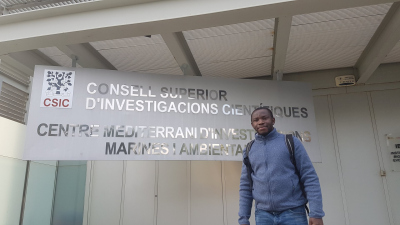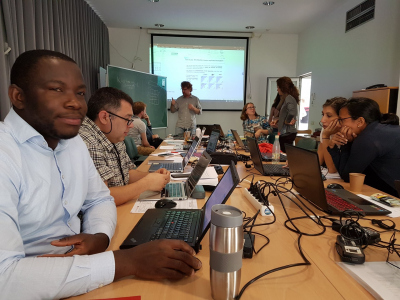- Graduate School GLOMAR
- PhD student reports
- Other activities
- Seth Mensah Abobi
Seth Mensah Abobi
Report of GLOMAR PhD student Seth Mensah Abobi about his participation in the 5th Edition of the Training Course Modelling Aquatic Ecosystems with Ecopath, Ecosim and Ecospace held at the Institut de Ciences del Mar in Barcelona, Spain from 22 to 26 October 2018.
One of the three focus areas of my doctoral project deals with comparative assessment of biodiversity, food web structures and fisheries productivity of reservoirs using Ecopath models and ecological network analysis. Therefore, the training course on Modelling Aquatic Ecosystems with Ecopath, Ecosim and Ecospace held at Institut de Ciències del Mar (CSIC) in Barcelona, Spain from 22nd October to 26th October 2018 was crucial for my project. The course included both theory and practice sessions. The instructors for the course were: Dr. Marta Coll, Jeroen Steenbeek, Xavier Corrales and Daniel Vilas. The course was in two parts. A three-day introductory course (introduction to Ecopath, Ecosim and Ecospace), and a two-day specialised course (advance spatial-temporal modelling with Ecospace).
On the first day, we were introduced to the basic concepts of Ecopath and how to balance Ecopath models with exercises using Ecopath with Ecosim software, version 6 (EwE6). The exercises were useful in exploring the software and getting to know the data required for Ecopath model parameterization. Lectures on Tuesday morning were focused on analysing and interpreting Ecopath outputs, and in the afternoon we were introduced to Ecosim. The Ecosim sessions were particularly useful for me since my project include using time dynamics to understand the indirect effects of fishing, trade-offs between fisheries, ecosystem effects of environmental conditions and simulation of sustainable fishing regimes. The Ecosim session continued on Wednesday with a lecture on Ecosim fitting to time and understanding the drivers behind changes in ecosystems. From Wednesday afternoon to Friday, the lectures and practical sessions were mainly on Ecospace, which is a time dynamic spatially explicit model. Lectures were on general principles, Ecospace niche modelling and data needed for spatial-temporal modelling with Ecospace. On Friday, we learnt how to analyse and interpret outputs of Ecospace niche model dynamics.
Scientists and graduate students working in different regions and on different ecosystems attended the course and I learnt a lot from participants working on questions and systems similar to my project. The course provided useful information and ideas on methodological and analytical approaches that I can use for comparative assessment of freshwater ecosystem-based models.
I wish to express my appreciation GLOMAR and ZMT for providing funds for the training course.




